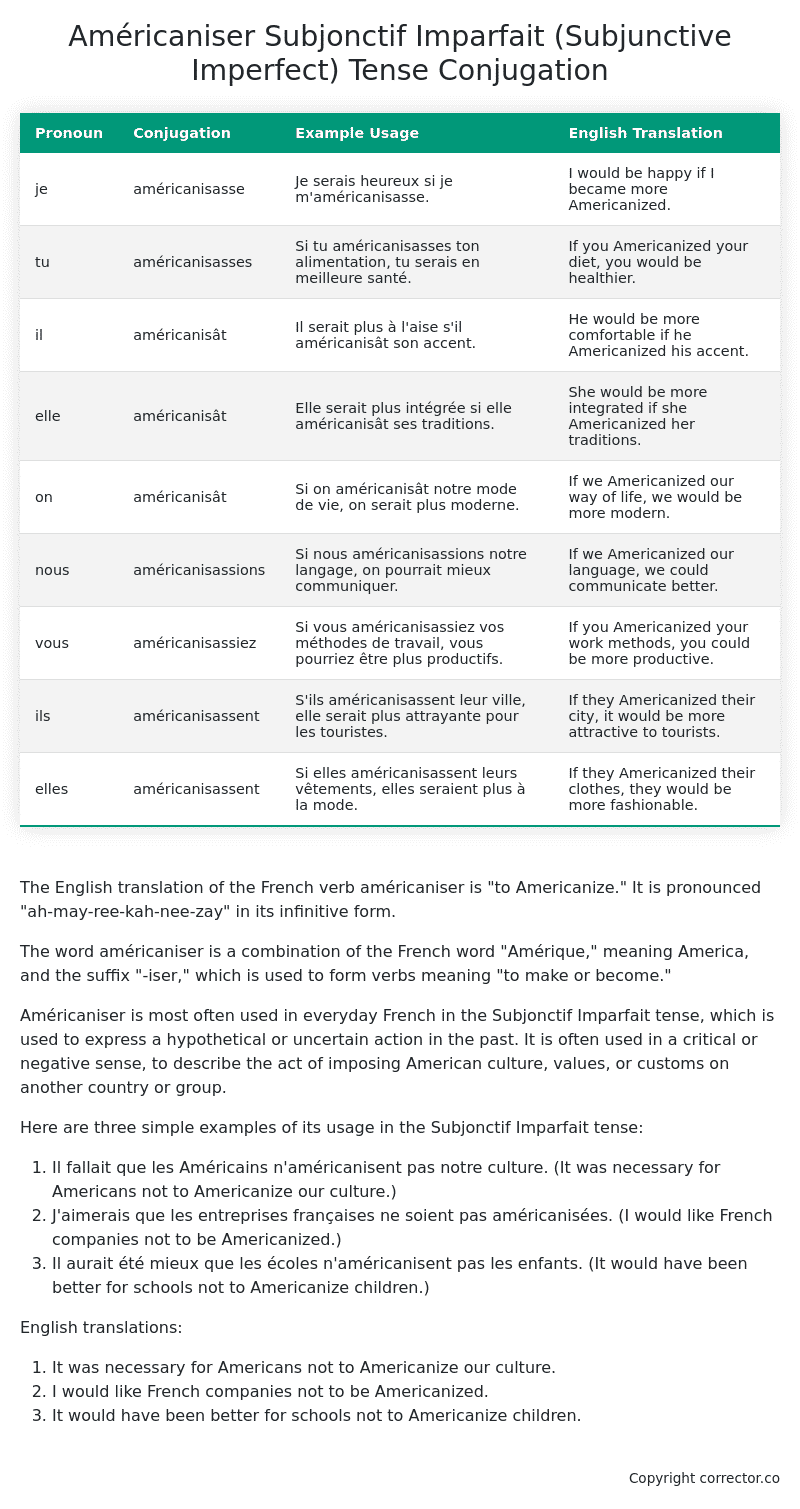Subjonctif Imparfait (Subjunctive Imperfect) Tense Conjugation of the French Verb américaniser
Introduction to the verb américaniser
The English translation of the French verb américaniser is “to Americanize.” It is pronounced “ah-may-ree-kah-nee-zay” in its infinitive form.
The word américaniser is a combination of the French word “Amérique,” meaning America, and the suffix “-iser,” which is used to form verbs meaning “to make or become.”
Américaniser is most often used in everyday French in the Subjonctif Imparfait tense, which is used to express a hypothetical or uncertain action in the past. It is often used in a critical or negative sense, to describe the act of imposing American culture, values, or customs on another country or group.
Here are three simple examples of its usage in the Subjonctif Imparfait tense:
- Il fallait que les Américains n’américanisent pas notre culture. (It was necessary for Americans not to Americanize our culture.)
- J’aimerais que les entreprises françaises ne soient pas américanisées. (I would like French companies not to be Americanized.)
- Il aurait été mieux que les écoles n’américanisent pas les enfants. (It would have been better for schools not to Americanize children.)
English translations:
- It was necessary for Americans not to Americanize our culture.
- I would like French companies not to be Americanized.
- It would have been better for schools not to Americanize children.
Table of the Subjonctif Imparfait (Subjunctive Imperfect) Tense Conjugation of américaniser
| Pronoun | Conjugation | Example Usage | English Translation |
|---|---|---|---|
| je | américanisasse | Je serais heureux si je m’américanisasse. | I would be happy if I became more Americanized. |
| tu | américanisasses | Si tu américanisasses ton alimentation, tu serais en meilleure santé. | If you Americanized your diet, you would be healthier. |
| il | américanisât | Il serait plus à l’aise s’il américanisât son accent. | He would be more comfortable if he Americanized his accent. |
| elle | américanisât | Elle serait plus intégrée si elle américanisât ses traditions. | She would be more integrated if she Americanized her traditions. |
| on | américanisât | Si on américanisât notre mode de vie, on serait plus moderne. | If we Americanized our way of life, we would be more modern. |
| nous | américanisassions | Si nous américanisassions notre langage, on pourrait mieux communiquer. | If we Americanized our language, we could communicate better. |
| vous | américanisassiez | Si vous américanisassiez vos méthodes de travail, vous pourriez être plus productifs. | If you Americanized your work methods, you could be more productive. |
| ils | américanisassent | S’ils américanisassent leur ville, elle serait plus attrayante pour les touristes. | If they Americanized their city, it would be more attractive to tourists. |
| elles | américanisassent | Si elles américanisassent leurs vêtements, elles seraient plus à la mode. | If they Americanized their clothes, they would be more fashionable. |
Other Conjugations for Américaniser.
Le Present (Present Tense) Conjugation of the French Verb américaniser
Imparfait (Imperfect) Tense Conjugation of the French Verb américaniser
Passé Simple (Simple Past) Tense Conjugation of the French Verb américaniser
Passé Composé (Present Perfect) Tense Conjugation of the French Verb américaniser
Futur Simple (Simple Future) Tense Conjugation of the French Verb américaniser
Futur Proche (Near Future) Tense Conjugation of the French Verb américaniser
Plus-que-parfait (Pluperfect) Tense Conjugation of the French Verb américaniser
Passé Antérieur (Past Anterior) Tense Conjugation of the French Verb américaniser
Futur Antérieur (Future Anterior) Tense Conjugation of the French Verb américaniser
Subjonctif Présent (Subjunctive Present) Tense Conjugation of the French Verb américaniser
Subjonctif Passé (Subjunctive Past) Tense Conjugation of the French Verb américaniser
Subjonctif Imparfait (Subjunctive Imperfect) Tense Conjugation of the French Verb américaniser (this article)
Conditionnel Présent (Conditional Present) Tense Conjugation of the French Verb américaniser
Conditionnel Passé (Conditional Past) Tense Conjugation of the French Verb américaniser
L’impératif Présent (Imperative Present) Tense Conjugation of the French Verb américaniser
L’infinitif Présent (Infinitive Present) Tense Conjugation of the French Verb américaniser
Struggling with French verbs or the language in general? Why not use our free French Grammar Checker – no registration required!
Get a FREE Download Study Sheet of this Conjugation 🔥
Simply right click the image below, click “save image” and get your free reference for the américaniser Subjonctif Imparfait tense conjugation!

Américaniser – About the French Subjonctif Imparfait (Subjunctive Imperfect) Tense
Formation
Common Everyday Usage Patterns
Interactions with Other Tenses
Subjonctif Présent
Indicatif Passé Composé
Conditional
Conditional Perfect
Summary
I hope you enjoyed this article on the verb américaniser. Still in a learning mood? Check out another TOTALLY random French verb conjugation!


